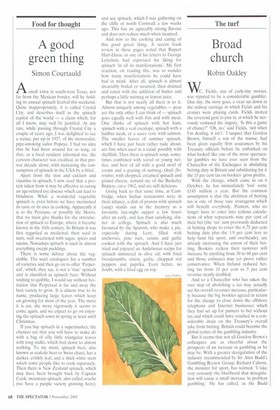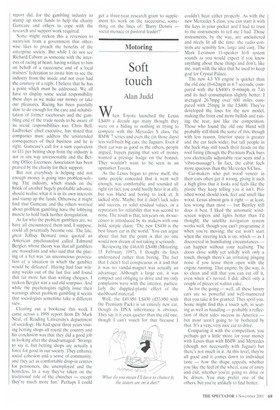The turf
Broad church
Robin Oakley
W.0 . Fields, star of early-day movies, was reputed to be a considerable gambler. One day, the story goes, a vicar sat down in the railway carriage in which Fields and his cronies were playing cards. Fields invited the reverend gent to join in, at which he nervously ventured the inquiry, Is this a game of chance?"0h, no,' said Fields, 'not when I'm dealing, it isn't.' I suspect that Gordon Brown, himself a son of the manse, had been given equally firm assurances by his Treasury officials before he embarked on what looked like one of the more spectacular gambles we have ever seen from the Chancellor of the Exchequer in abolishing betting duty in Britain and substituting for it the 15 per cent tax on bookies' gross profits.
With the change, which came in on 6 October. he has immediately 'lost' some £145 million a year. But the common assumption is that the abolition of betting tax is one of those rare stratagems which will benefit everybody. Punters, who no longer have to enter into tedious calculations of what represents nine per cent of their bet (the 'tax' sum previously deducted in betting shops to cover the 6.75 per cent betting duty plus the 1.9 per cent levy to help fund the sport, and overheads), are already increasing the extent of their betting. Bookies reckon their turnover will increase by anything from 30 to 60 per cent and those estimates may yet prove rather conservative. When Ireland reduced betting tax from 10 per cent to 5 per cent revenue nearly doubled.
And so a Chancellor who has taken the rare step of abolishing a tax may actually see his overall revenues increase, particularly because the big bookies agreed in return for the change to close down the offshore telephone and Internet businesses which they had set up for punters to bet without tax and which could have resulted in a considerable drain on the Treasury's overall take from betting. Britain could become the global centre of the gambling industry.
But it seems that not all Gordon Brown's colleagues are as cheerful about the prospects of an increase in gambling as he may be. With a greater deregulation of the industry recommended by Sir Alan Budd's Gambling Review Group, Richard Caborn, the minister for sport, has warned, 'I take very seriously the likelihood that deregulation will cause a small increase in problem gambling.' He has called, as the Budd report did, for the gambling industry to stump up more funds to help the charity Gamcare and others to cope with the research and support work required.
Some might reckon this a reversion to nannyism from a government that otherwise likes to preach the benefits of the enterprise society. But while I do not see Richard Caborn as someone with the interests of racing at heart, having written to him on behalf of a racecourse and of a local trainers' federation to invite him to see the industry from the inside and not even had the courtesy of a reply, I believe that he has a point which must be addressed. We all have to display some social responsibility these days as we make our money or take our pleasures. Racing has been painfully slow to do enough for the care and rehabilitation of former racehorses and the gambling end of the trade needs to be aware of its social responsibilities too. Chris Bell, Ladbrokes chief executive, has stated that companies must address the unintended consequences of their business and he is right. Gamcare's call for a sum equivalent to £11 per betting shop from the industry is not in any way unreasonable and the Betting Office Licensees Association has been praised by the charity for their support.
But not everybody is helping and not enough money is going into problem-solving. The industry, which stands on the brink of another hugely profitable advance, should realise what it is in its own interests and stump up the funds. Otherwise it might find that Gamcare and the others worried about problem gambling have the lobbying muscle to hold back further deregulation.
As for who the problem gamblers are, we have all encountered them and. I suppose, could all potentially become one. The late, great Jeffrey Bernard once quoted an American psychoanalyst called Edmund Bergler, whose theory was that all gamblers are masochists and who said that the placing of a bet was an unconscious provocation of a situation in which the gambler would be defeated'. Having had four winning weeks out of the last five and found that far more fun than writing cheques. I reckon Bergler was a sad old sourpuss. And while the psychologists rightly issue their warnings about problem gambling it seems that sociologists sometime take a different view.
Clearing out a bookcase this week I came across a 1998 report from Dr Mark Neal, of Reading University's department of sociology. He had spent three years visiting betting shops all round the country and his conclusion was that they did a good job in looking after the disadvantaged: 'Strange to say it, but betting shops are actually a force for good in our society. They enhance social cohesion and a sense of community, and they act as comfortable drop-in centres for pensioners, the unemployed and the homeless. In a way they've taken on the traditional role of the churches — except they're much more fun.' Perhaps I could get a three-year research grant to supplement his work on the racecourse, something on the lines of: 'Barry Dennis — social menace or pastoral leader?'



















































































 Previous page
Previous page